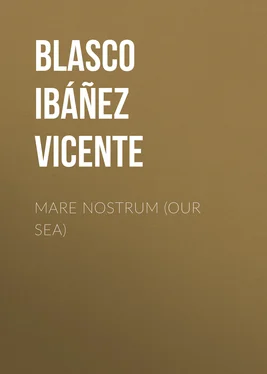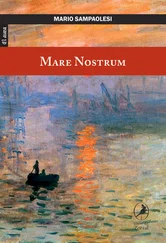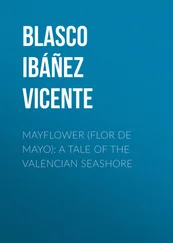Vicente Blasco Ibáñez - Mare Nostrum (Our Sea)
Здесь есть возможность читать онлайн «Vicente Blasco Ibáñez - Mare Nostrum (Our Sea)» — ознакомительный отрывок электронной книги совершенно бесплатно, а после прочтения отрывка купить полную версию. В некоторых случаях можно слушать аудио, скачать через торрент в формате fb2 и присутствует краткое содержание. Жанр: foreign_prose, foreign_antique, на английском языке. Описание произведения, (предисловие) а так же отзывы посетителей доступны на портале библиотеки ЛибКат.
- Название:Mare Nostrum (Our Sea)
- Автор:
- Жанр:
- Год:неизвестен
- ISBN:нет данных
- Рейтинг книги:5 / 5. Голосов: 1
-
Избранное:Добавить в избранное
- Отзывы:
-
Ваша оценка:
- 100
- 1
- 2
- 3
- 4
- 5
Mare Nostrum (Our Sea): краткое содержание, описание и аннотация
Предлагаем к чтению аннотацию, описание, краткое содержание или предисловие (зависит от того, что написал сам автор книги «Mare Nostrum (Our Sea)»). Если вы не нашли необходимую информацию о книге — напишите в комментариях, мы постараемся отыскать её.
Mare Nostrum (Our Sea) — читать онлайн ознакомительный отрывок
Ниже представлен текст книги, разбитый по страницам. Система сохранения места последней прочитанной страницы, позволяет с удобством читать онлайн бесплатно книгу «Mare Nostrum (Our Sea)», без необходимости каждый раз заново искать на чём Вы остановились. Поставьте закладку, и сможете в любой момент перейти на страницу, на которой закончили чтение.
Интервал:
Закладка:
They all liked him:—the Basque captains, economical in words, rude and sparing in affectionate discourse; the Asturian and Galician captains, self-confident and spendthrift in strange contrast to their sobriety and avaricious character when ashore; the Andalusian captains, reflecting in their witty talk white Cadiz and its luminous wines; the Valencian captains who talk of politics on the bridge, imagining that they are going to become the navy of a future republic; and the captains from Catalunia and Mallorca as thoroughly acquainted with business affairs as are their ship-owners. Whenever necessity obliged them to defend their rights, they immediately thought of Ulysses. Nobody could write as he could.
The old mates who had worked their way up from the lower ranks, men of the sea who had begun their career on coasting vessels and could only with great difficulty adjust their practical knowledge to the handling of books, used to speak of Ferragut with pride.
"They say that men of the sea are an uncultivated people…. Here they have Don Luis who is one of us. They may ask him whatever they wish…. A real sage!"
The name of Ulysses always made them stammer. They believed it a nickname, and not wishing to show any lack of respect, they had finally transformed it into "Don Luis." For some of them, Ferragut's only defect was his good luck. So far not a single boat of which he had had command had been lost. And every sailor constantly on the sea ought to have at least one of these misfortunes in his history in order to be a real captain. Only landlubbers never lose their boats.
When his mother died, Ulysses was very undecided about the future, not knowing whether to continue his sea life, or undertake something entirely different. His relatives at Barcelona, merchants quick to understand and appraise a fortune, added up what the notary and his wife had left him and put with that what Labarta and the doctor had contributed, until it amounted to a million pesetas…. And was a man with as much money as that to go on living like a poor captain dependent upon wages to maintain his family!…
His cousin, Joaquin Blanes, proprietor of a factory for knit goods, urged him repeatedly to follow his example. He ought to remain on shore and invest his capital in Catalan industry. Ulysses belonged to this country both on his mother's side and because he was born in the neighboring land of Valencia. There was great need of men of fortune and energy to take part in the government. Blanes was entering local politics with the enthusiasm of a middle-class man for novel adventure.
Cinta never said a word to influence her husband. She was the daughter of a sailor and had accepted the life of a sailor's wife. Furthermore, she looked upon matrimony in the light of the old familiar traditions:—the woman absolute mistress of the interior of the home, but trusting outside affairs to the will of the lord, the warrior, the head of the hearth, without permitting herself opinions or objections to their acts.
It was Ulysses, therefore, who decided to abandon the seafaring life. Worked upon by the suggestions of his cousins, it needed only a little dispute with one of the directors of the shipping firm to make him hand in his resignation, and refuse to reconsider it, although urged by the protests and entreaties of the other stockholders.
In the first months of his existence ashore, he was amazed at the desperate immovability of everything. The world was made up of revolting rigidity and solidity. He felt almost nauseated at seeing all his possessions remain just where he left them, without the slightest fluctuation, or the least bit of casual caprice.
In the mornings upon opening his eyes, he at first experienced the sweet sensation of irresponsible liberty. Nothing affected the fate of that house. The lives of those that were sleeping on the other floors above and below him had not been entrusted to his vigilance…. But in a few days he began to feel that there was something lacking, something which had been one of the greatest satisfactions of his existence,—the sensation of power, the enjoyment of command.
Two maids were now always hastening to him with a frightened air at the sound of his voice, or the ringing of his bell. That was all that was left to him who had commanded dozens of men of such ugliness of temper that they struck terror to all beholders when they went ashore in the ports. Nobody consulted him now, while on the sea everybody was seeking his counsel and many times had to interrupt his sleep. The house could go on without his making the rounds daily from the cellars to the roof, overseeing even the slightest spigot. The women who cleaned it in the mornings with their brooms were always obliging him to flee from his office. He was not permitted to make any comment nor could he extend a gold-striped arm as when he used to scold the barefooted, bare-breasted deck-swabbers, insisting that the deck should be as clean as the saloon. He felt himself belittled, laid to one side. He thought of Hercules dressed as a woman and spinning wool. His love of family life had made him renounce that of a powerful man.
Only the considerate treatment of his wife, who surrounded him with assiduous care as though wishing to compensate for their long separations, made the situation bearable. Furthermore, his conscience was enjoying a certain satisfaction in being a land-father, taking much interest in the life of his son who was beginning to prepare to enter the institute, looking over his books, and aiding him in understanding the notes.
But even these pleasures were not of long duration. The family gatherings in his home or at his relatives' bored him unspeakably; so did the conversations with his cousins and nephews about profits and business deals, or about the defects of centralized tyranny. According to them, all the calamities of heaven and earth were coming from Madrid. The governor of the province was the "Consul of Spain."
These merchants interrupted their criticisms only to listen in religious silence to Wagner's music banged out on the piano by the girls of the family. A friend with a tenor voice used to sing Lohengrin in Catalan. Enthusiasm made the most excitable roar, "the hymn … the hymn!" It was not possible to misunderstand. For them there was only one hymn in existence, and in a trilling undertone they would accompany the liturgic music of Los Segadores (The Reapers). [The revolutionary song of Catalunia, originated by a band of reapers in the seventeenth century.]
Ulysses used to recall with homesickness his life as commander of a transatlantic liner,—a wide, universal life of incessant and varied horizons, and cosmopolitan crowds. He could see himself detained on deck by groups of elegant maidens who would beg him for new dances in the coming week. His footsteps were surrounded with white fluttering skirts, veils that waved like colored clouds, laughter and trills, Spanish chatter that appeared set to music:—all the frolicsome jargon of a cage of tropical birds.
Ex-presidents of the South American republics,—generals or doctors who were going to Europe to rest,—used to relate to him on the bridge, with Napoleonic gravity, the principal events in their history. The business men starting out for America confided to him their stupendous plans:—rivers turned from their courses, railroads built across the virgin forests, monstrous electric forces extracted from huge waterfalls varying in breadth, cities vomited from the desert in a few weeks, all the marvels of an adolescent world that desires to realize whatever its youthful imagination may conceive. He was the demi-urge of this little floating world: he disposed of joy and love as the spirit moved him.
In the scorching evenings around the equator, it was enough for him to give an order to rouse things and beings from their brutish drowsiness. "Let the music begin, and refreshments be served." And in a few moments dancers would be revolving the whole length of the deck, and smiling lips and eyes would become brilliantly alight with illusion and desire. Behind him, his praises were always being sounded. The matrons found him very distinguished. "It is plain to be seen that he is an exceptional person." Stewards and crew circulated exaggerated accounts of his riches and his studies. Some young girls sailing for Europe with imaginations seething with romance were very much aghast to learn that the hero was married and had a son. The solitary ladies stretched out on a chaise-longue, book in hand, upon seeing him would arrange the corolla of their petticoats, hiding their legs with so much precipitation that it always left them more uncovered; then fixing upon him a languishing glance, they would begin a dialogue always in the same way.
Читать дальшеИнтервал:
Закладка:
Похожие книги на «Mare Nostrum (Our Sea)»
Представляем Вашему вниманию похожие книги на «Mare Nostrum (Our Sea)» списком для выбора. Мы отобрали схожую по названию и смыслу литературу в надежде предоставить читателям больше вариантов отыскать новые, интересные, ещё непрочитанные произведения.
Обсуждение, отзывы о книге «Mare Nostrum (Our Sea)» и просто собственные мнения читателей. Оставьте ваши комментарии, напишите, что Вы думаете о произведении, его смысле или главных героях. Укажите что конкретно понравилось, а что нет, и почему Вы так считаете.












